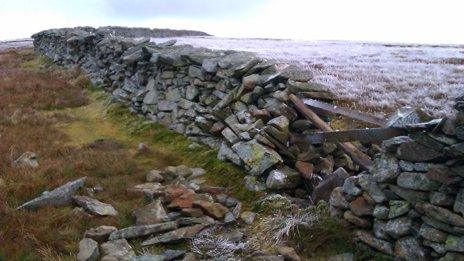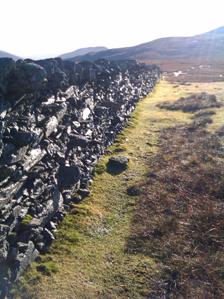Dry stone wall 'built by Napoleon PoWs' is restored
- Published

No-one quite knows if Napoleonic French PoWs built this remote wall
Snowdonia legend has long had it that Wales' highest wall was built around 200 years ago by French prisoners of war taken from Napoleon's army.
The dry stone construction, over 3,000 ft (900m) above sea level amid the barrenness of Foel Fras mountain in the Carneddau, has now been restored - some 216 years after the last invasion of Britain by a foreign power.
On 22 February 1797, around 1,400 French and Irish troops landed in Fishguard in Pembrokeshire but three days later they had been quickly overcome by defenders.
Many were held in Wales as prisoners of war throughout the rest of the 21-year Napoleonic wars.
Yet historians disagree as to whether it is likely that the Foel Fras wall could have been built by the French prisoners taken during this and subsequent battles.
Paul Chamberlain, author of 'Hell Upon Water: Prisoners of War in Britain 1793-1815' said: "The French Revolutionary and Napoleonic Wars represented something of a watershed for European combat, as they were the first major conflicts during which large numbers of surrendering troops were taken prisoner rather than slaughtered.
"From 1793 until 1814, over 200,000 French and French allies were held as PoWs, and whilst it's impossible to put a definite figure on it, several thousand of them would have been held in Wales.
"But the story that they built some of the walls in the area is a local myth, as PoWs were not used on construction projects as it took work away from the civilian workforce."
He also explained that while many of the irregular French and Irish were imprisoned in Pembrokeshire, those held further north in Montgomeryshire and parts of Meirionnydd were mainly officers paroled to live freely amongst the local population, lessening the likelihood that they would have been forced into hard labour.
However, Dr Cassie Hadwin, a linguistic historian who has researched French influences on Wales, says that while there is no conclusive proof either way, it is by no means out of the question that the Foel Fras walls could have been built by French PoWs.
"It's certainly true to say that there are vast differences in the experiences of the French PoWs held in north and south Wales," said Dr Hadwin.

The wall may have been a 'labour of love' by grateful PoWs
"In the south - partly because it was closer to the invasion, and partly because of the lower rank of the prisoners held there - conditions were dreadful. An inspection of the Pembroke PoW depot in 1797 found 56 prisoners held in a single room, with no toilets, no fresh straw for seven weeks, and no drinking water for three days.
"But in Montgomeryshire and Meirionnydd there are numerous accounts of paroled French and German officers having blended seamlessly into Welsh society, and remaining there long after the peace of 1814.
"You can see evidence of it to this day, where there are clusters of names like Beauchamp and Hubbard in the towns in which they were held."
Dr Hadwin points to a newspaper report in The Cambrian in December 1813 detailing how French officers were foremost in the rescue attempts after a wild-fire engulfed the town of Welshpool.
Similarly, a letter sent to the people of Llanfyllin by the freed French PoWs on 17 June, 1817 states how "the esteemed inhabitants of Llanfyllin will ever remain in their thankful remembrance".
Dr Hadwin said: "In these happier and more comfortable surroundings, Napoleon's PoWs in mid and north Wales were able to indulge in creating some breathtaking pieces of art, much of which is displayed at Powis Castle.
'Artisan skills'
"There are written accounts of murals painted by French PoWs billeted in Newtown, in appreciation of the hospitality they received there.
"Also there are numerous examples of fine miniatures of French and British ships carved from bone and an exquisitely detailed straw collage of Powis Castle.
"The truth is that we'll never know for certain who built the Foel Fras walls, but given the artisan skills the PoWs displayed elsewhere, coupled with the difficult and inaccessible location of the walls, I'd argue that they were a labour of love rather than forced labour.
"As such, who's to say that the local legend isn't true, and that the wall isn't the gift of a group of now long-forgotten Frenchmen who fell in love with Wales?"